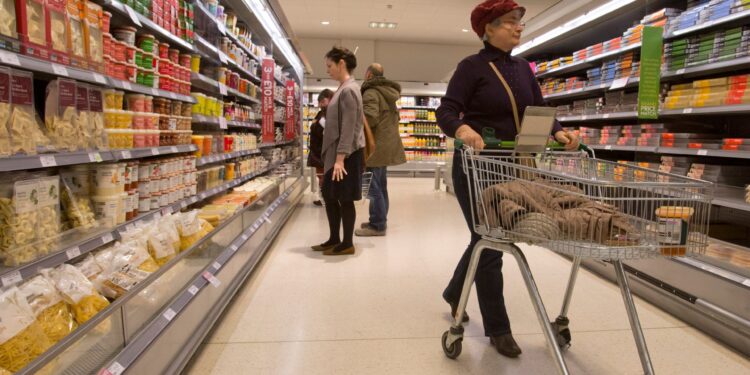The vast majority of consumers in Britain plans to purchase local products after fears of the high prices of imported products after the comprehensive customs duties imposed by US President Donald Trump, according to an opinion poll that conveyed the results of the British Financial Times.
According to the poll conducted by “Ebinum Research” at the request of Barclays Bank, about 71% of consumers expressed their desire to support British companies by buying more products made in Britain after Trump imposed a 10% tax on British imports this month.
The poll showed that about two -thirds of consumers are concerned about the high prices of imported products, while 2 out of 5 are looking for alternatives made in Britain.
British products are subject to 10% American customs duties, while 25% fees are imposed on steel and cars, and American customs duties are imposed by 10% on European Union commodities during the current stopping period for 90 days for customs duties, and up to 145% on Chinese products.
https://www.youtube.com/watch?v=1-chalbd8re
A possible effect on growth
Policy and economists at the Bank of England warned that the customs tariffs that have sparked unrest in the financial markets and have sparked fears of global recession will negatively affect Britain’s growth, but its impact on inflation is still unclear, given the uncertainty about how other countries respond.
Finance Minister Rachel Reeves – who is looking forward to a global role in building commercial alliances in the wake of customs duties – refused last week to support the “British products buying campaign”.
“With regard to the purchase of British products, I think everyone will make its own decisions, what we do not want is a commercial war, as Britain will become closed to itself,” Reeves told the House of Commons.
She added that if “every country in the world decided to purchase only locally manufactured products, this is not a good approach to proceeding, and that Britain has benefited greatly from reaching global markets, and that continuing to do so is in our national interest.”
The uncertainty about the impact of customs duties may affect the rise in consumer spending since the beginning of this year, and data from Barclays on Tuesday showed that although consumers’ spending was affected by the coincidence of Easter with its arrival in March of last year and April this year, it increased by an annual rate of 0.5% in March, a decrease of 1% in February.
Last month, the increase was driven by 2.2% in unrelated spending, including 13.4% leaps in parking centers and 11% in health and beauty.
The newspaper quoted Karen Johnson, head of the retail department in Barclays, as saying that consumers feel the pressure of the height of bills, and that they “realize the impact of recent global events on their financial conditions.”
Recruitment
In another context, British companies dispensed with workers at the fastest pace since the beginning of the “Kovid-19” pandemic, prior to being affected by an increase of 26 billion pounds (34.3 billion dollars) in American salary and customs duties.
Tax data showed that the number of workers registered in salaries decreased by 78,467 in March, before the first budget procedures for the Labor Party in the current April, according to the National Statistics Office on Tuesday.
The vacancies in the first quarter decreased below the pre -bacterial levels for the first time since 2021, according to Bloomberg’s data.
These figures were the latest indication that the high employment costs – which also include another significant increase in the minimum wage – and the deterioration of the economic situation have prompted companies to lay off their employees.
The decrease in employment represents a heavy blow to the Minister of Finance Rachel Reeves after indications that the economy has begun to come out of the recession that the government of the Labor Party has been required since it took power in July.
Since the declaration of the budget in October, the number of employees has decreased by 120,000 employees, indicating that the policies of the Labor Party have undermined the efforts made to attract more people to the labor market.
“The largest decrease in the number of employees since the pandemic indicates that companies have begun to reduce their power operating in March before the significant increase in the employment costs that entered into force in April,” Bloomberg quoted economist Thomas Bug in RSMUK.


